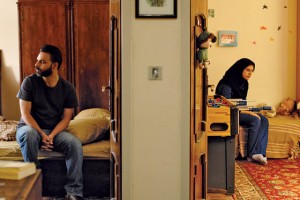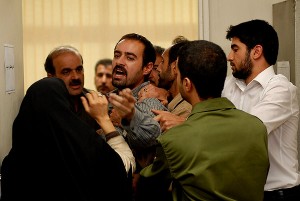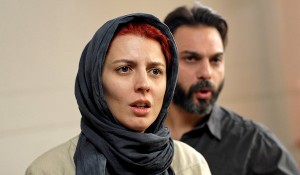
Asghar Farhadi’s A Separation is one of those movies that has been so acclaimed—with every award you can think of, including the Oscar, falling into its lap—that you’re almost dared not to love it. (Just look at the harsh remarks the consensus-lovers directed at the poor sap on Rotten Tomatoes who dared to ruin the film’s 100-percent approval rating.) I’d also been told by people whose opinions I respect (though don’t always agree with) that it was “amazing” and that it lived up to the hype. And having seen it, I have to say that I think A Separation is very good indeed, if not quite as amazing as I’d been told. If I’d come upon it cold, I might feel differently, but I’ll never know. I’ll settle on very good and, yes, a must-see.

I tend to think that the film has been done something of a disservice by intimations that it contains a mystery worthy of Hitchcock, because I don’t think that’s true on any level. The only mystery in the film is actually an unresolved one, while mystery that’s generally being referred to is pretty clear—or ought to be—to anyone paying attention. (Without giving away too much, I’ll just say it’s a basic rule of film that there’s a reason when a film cuts away from an unresolved scene.) I don’t think Fahradi was out to make a mystery, though he had to know that A Separation was plot-driven—even though the plot is almost a hook for his broader concerns. (And it’s not impossible that the complexity of the plot is in part there to distract the Iran government from other aspects of the film.)

The film is called A Separation and it does focus on the separation of the two main characters, Nader (Peyman Maadi) and Simin (Leila Hatami). (For that matter, the Iranian title includes the characters’ names.) The film even opens with a long take of the two addressing an unseen judge to whom they’re applying for a divorce—a tricky undertaking in Iran. The case here is that they have applied for—and received—visas for themselves and their daughter, Termeh (Sarina Farhadi, the director’s daughter), to leave Iran. But Nader has backed out, saying he has to remain and care for his Alzheimer-afflicted father (Ali-Ashhar Shahbazi). His wife’s argument that his father doesn’t even know who his son is anymore is countered by Nader’s assertion that he knows who his father is. Her own rather ill-advised statement that she wants her daughter to have the benefit of growing up someplace other than Iran certainly cuts no ice with the judge, and he dismisses theirs as a “small problem,” denying the divorce. This prompts Simin to leave, moving back in with her parents.

That move is what propels the rest of the film, since it compels Nader to hire a woman, Razieh (Sareh Bayat), as housekeeper charged with looking after Nader’s father, something that will require her do things that are not in keeping with her religious views. (At one point she has to call an adviser to see if it’s a sin to deal with the old man’s incontinence.) This opens up questions of even more separations—not just the religious differences between the basically secular family and Razieh’s fundamentalist religious views, but also between the wealthy and the poor. It is only Razieh’s poverty that forced her to take such a job—and to take it at substandard wages.
It’s a situation that will fracture things even further as the story progresses. The less said about the specifics of the events, the better, I think. The events should be experienced with a minimum of foreknowledge (which, by the way, is how I saw it). These, however, are less important in themselves than the study of the the characters and their reactions to it all—and how neither law or religion are capable of dealing with every situation in a cut-and-dry manner. You may also find that some aspects of this very foreign story seem disturbingly not all that foreign. Rated PG-13 for mature thematic material.




The majority of the audience we saw the film with sat in silence as the closing credits scrolled.
A reasonable response. I’ve seen that on a few films, but very few.